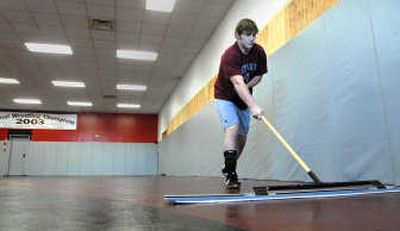Coaches stress stricter hygiene to deter MRSA

Scary new statistics about drug-resistant bacterial infections have sent shivers through an unlikely section of the community: the high-school locker room.
Coaches throughout the Inland Northwest say they’re emphasizing new hygiene rules this year aimed at keeping young athletes healthy and safe from potentially dangerous infections such as methicillin-resistant Staphylococcus aureus, or MRSA.
From the football field to the wrestling mat, athletes in contact sports are being urged to pay new attention to cleanliness, whether that means equipment maintenance, laundry duty or post-practice showers.
“We’re saying that personal hygiene is very important,” said Butch Walter, athletic director at Central Valley High School and coordinator of the Greater Spokane League. “Take a shower and use soap before you go home, while the pores are still open.”
To which their parents say: Good luck with that.
“My son doesn’t come home showered,” said Kathy Minnerly, mother of the Ferris High School football quarterback, Jeff. “And I see his friends heading home and they’re not showered, either.”
Raising awareness among parents, players and fellow coaches is a goal for Walter, who heard the word about MRSA during a summer conference of athletic directors. There, he learned that the antibiotic-resistant bacteria once common mostly in hospitals are showing up more often in public places, including gyms and locker rooms.
Then came new research last week that showed MRSA infections caused serious illness in nearly 100,000 Americans last year and killed nearly 19,000 – as many as AIDS.
“It only recently came on the radar in our area,” he said, adding later: “We’re talking about something that is on par with hepatitis, HIV, the blood-borne pathogens.”
While it’s not clear how common MRSA is among sports teams, isolated incidents in the past several years have turned up the infection in high school, amateur and professional sports teams from fencing and football to wrestling. Just last week, a Florida school district sanitized locker rooms and gymnasiums after nine students, mostly athletes, were infected with MRSA.
Two cases of MRSA have been reported this year in the Spokane School District, said Kathe Reed-McKay, coordinator of district health services. One case involved a preschooler and the other involved a high school student who was not an athlete.
The problem is now recognized as a serious issue throughout the Inland Northwest, said Pat Whitcomb, head wrestling coach at North Idaho College in Coeur d’Alene.
“We’ve always taken precautions, but our concern with the new MRSA that’s out there is that that’s scary stuff,” Whitcomb said.
More than 1,000 wrestlers from elementary school through college will use mats in the NIC gymnasium this season, Whitcomb said. Before and after every practice, the mats are cleaned with bleach-based sanitizer aimed at killing germs for MRSA – and any other bug.
Maintaining equipment is so vital that Central Valley High School wrestling coach John Owen scrubs his mats himself.
“It’s that personal commitment,” said Owen, who said he’s been known to snap at people who walk across his clean mats. “I say, ‘I don’t walk across your kitchen table.’”
Owen, whose son Brian wrestles at University High School, urges his athletes to shower before they go home, to keep their clothing and equipment clean and to wash their hands often. And, he urges them to share the message at home.
“Parents need to get involved in the importance of showering,” he said.
The message needs to go out to girls as well as boys, said Walter. Anyone who participates in contact sports, including soccer, basketball and lacrosse, needs to take precautions.
“With your tennis players, it’s not going to be as critical,” he said.
Minnerly, the mother of two male athletes, said her boys hadn’t heard much yet about the new hygiene practices. Her older son, the quarterback, is good about keeping his practice jersey clean – with mom’s help – but his helmet is another story, she jokes.
Minnerly said she was aware of the increase in drug-resistant germs.
“I hadn’t put a whole lot of thought into it because I’ve been lucky with my kids and sports injuries,” she said. “I’m not as concerned about it, but I might change my mind if it happened to my kid.”